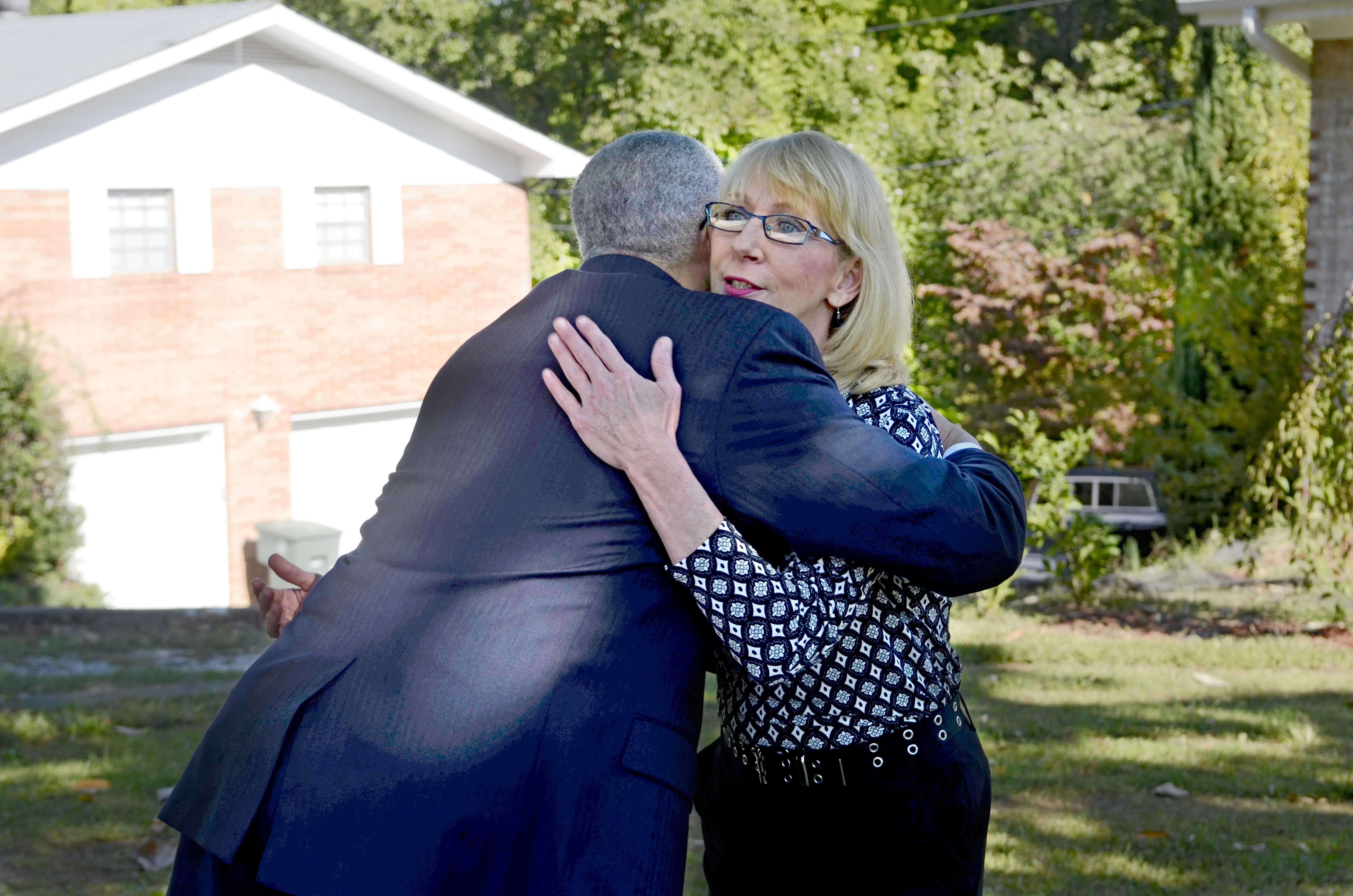 Stephanie Ferguson hugs David Johnson, president and CEO of Chattanooga Neighborhood Enterprise, after she signed papers in the front yard of her Hixson home Thursday to receive $15,000 in foreclosure prevention assistance. CNE this week reached a total of $1 million in assistance to local homeowners facing foreclosure.
Stephanie Ferguson hugs David Johnson, president and CEO of Chattanooga Neighborhood Enterprise, after she signed papers in the front yard of her Hixson home Thursday to receive $15,000 in foreclosure prevention assistance. CNE this week reached a total of $1 million in assistance to local homeowners facing foreclosure.How To Get Foreclosure Help• Attend any weekly 6 p.m. Thursday meeting at the Tennessee Career Center in Eastgate Town Center, next to the Electric Cowboy• Loans are zero-interest, zero-payment, zero-recourse loans that never have to be repaid if a homeowner remains in the house for five years or more• No paperwork required• Ineligible applicants may still receive counseling and other free help• Applicants must have become unemployed or suffered a 30 percent loss of income since 2008• May not make more than $75,000Source: Chattanooga Neighborhood Enterprise
When her husband died of cancer in 2008 and left the family with nothing, Stephanie Ferguson panicked - but she didn't give up.
Jobless, she didn't have the money for the $1,000 monthly payments on her tin-roofed Chattanooga house, which is shaded from the sun by two 82-year-old chestnut trees.
In the fall, baskets of fallen chestnuts twinkle in the autumn light as dusty rays of sun slip through the leaves. It's a nice, middle-class neighborhood, one of many threatened with evisceration if foreclosures render it a ghost town.
So Ferguson cashed her son Matthew's retirement account to prolong the inevitable. The money didn't last long, and soon the foreclosure notices began to arrive. She was more than $5,000 behind on her $133,000 house.
"The cash from the IRA allowed us to make some payments, but then they started hitting me with the foreclosures," she said Thursday.
Ferguson tried in vain to find a job while negotiating with the bank for more time.
"I tried to do a loan modification with Bank of America, but they wouldn't stop the foreclosure proceedings," she said.
Hers is a familiar tale that echoes across the country. But unlike so many other unfortunates, her story isn't over yet.
Through a little research, she found out that Chattanooga residents are eligible for $15,000 interest-free loans if they are threatened with losing their home to unemployment or a loss of income.
Loans For Homes
The money comes from TARP, the contentious U.S. government program that bailed out American automakers and rescued banks from insolvency at the height of the housing meltdown.
As one of the states hardest-hit by the housing crisis, Tennessee received $217 million for foreclosure prevention, which flows to needy Chattanooga homeowners through Chattanooga Neighborhood Enterprise.
"We've seen over 800 Chattanooga-area homeowners at risk of foreclosure, and 93 percent are still in their homes today," CNE President David Johnson said.
But challenges still lie ahead. Some people either don't know about the plan or don't trust it, he said.
"We're still working on outreach and getting the word out," Johnson said Thursday. "There are a lot of foreclosure prevention scams out there, so we're trying to let people know that there's free, confidential help available."
CNE has spent $1 million saving homeowners from losing their most valuable asset, but there's a lot more cash to give away, said Richard Johnson, business analyst for the Tennessee Housing Development Agency.
"We're hoping to have it all out the door in five years, but we've barely scratched the surface," Johnson said.
On the whole, the state has lent out just $2 million in interest-free loans, and committed only $5 million of the total $217 million available.
"The requirements are so easy to meet, but most people don't think they're eligible," he said. "They just don't think about it."
Foreclosure Flux
As the program is gearing up, however, the number of foreclosures in Hamilton County is declining from the peak reached in 2010. During the first nine months of 2011, property foreclosures in Hamilton County dropped nearly 30 percent to the lowest level since before the recession hit in 2007.
But some of that decline could be because of banks having trouble documenting the record number of mortgage defaults or imposing foreclosure moratoriums while fixing faulty paperwork.
The mortgage assistance from CNE is available to households with incomes below $74,980 for people who have either suffered a 30 percent income reduction or fallen into unemployment since 2008, said Jeremy Fitzsimmons, manager of CNE's homeownership center.
The $15,000 loans, which go up to $20,000 in Rhea, McMinn and Monroe counties, can cover back payments as well as current payments for up to a year, or up to 18 months in the hardest-hit areas, he said.
The Long Haul
The loan Ferguson received was just a stopgap.
After taking care of the late payments, she has just a five-month grace period until she's back on her own. And since her current loan locks her into paying down only the interest, she still owes the entire $133,600 principal she paid for her house.
Ferguson finally applied for food stamps this month, and is waiting for the first response to the nearly 80 resumes she sent out, she said.
"There's no other option," she said. "For this to work, I have to get a job. I don't have a choice."
She's not eligible to restructure the mortgage until she's been gainfully employed for two years, and right now that seems like forever to the 58-year-old mother.
"Everybody I know is retiring, and I'm looking for a job," she said. "I feel like a trout swimming upstream."
